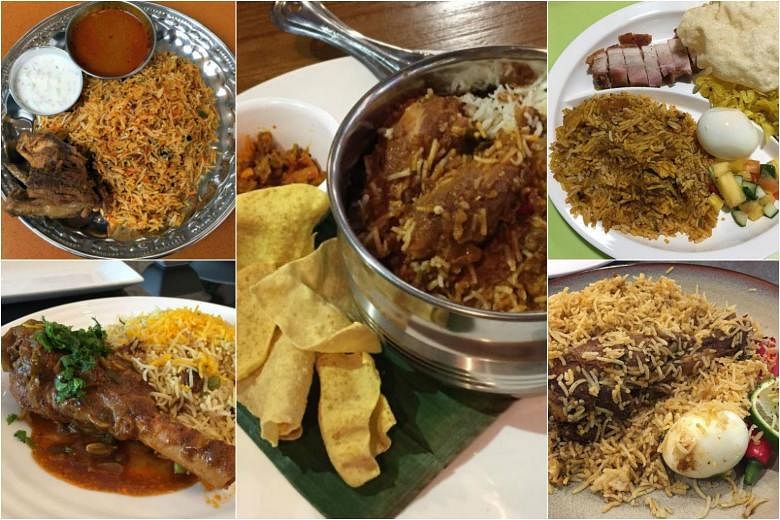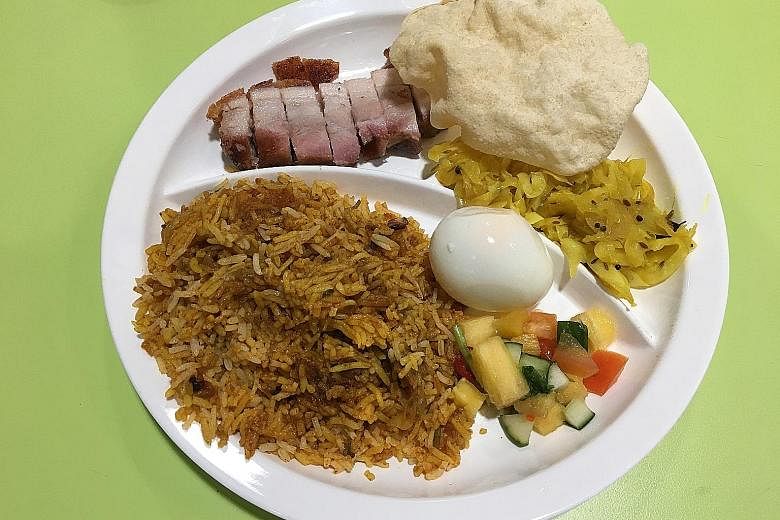Biryani is a comfort food. Who doesn't like a big pile of fluffy spiced rice topped with lush curry and meats?
In Singapore, you can find variations, ranging from the traditional to the hipster.
Here are some choice picks from ST Food's popular food review column Cheap & Good, which unearths some of the best budget eats you can find around the little red dot.
1. ANJALI RAGURAMAN RECOMMENDS
THE CEYLONESE AFFAIR

This review was first published on Sep, 10, 2017.
Sri Lankan food is still not as readily available as other South Asian cuisines here, but The Ceylonese Affair champions a few standout dishes from the island.
The stall is located in the upscale foodcourt that is Wild Market, a series of stalls that has taken over what used to be a large Chinese seafood restaurant in Shaw Towers. The stalls sell everything from ramen and French cuisine to burgers and truffle fries.
The highlight for me at The Ceylonese Affair is the appam (laced, fermented rice pancakes), a relatively hard-to-find dish here that is a staple in parts of South India and Sri Lanka.
It is slightly pricey, with the plain, "pal" or coconut milk appam costing $3 a piece or $4.50 for a set of two. An egg appam is priced at $3.80, as are all the special flavoured appam. Newfangled flavours include chocolate, butterscotch, strawberry, chilli flakes and peanut, but the real test is how well the cooks make the original milk and egg versions.
The curved pancakes are made to order in special appam woks that sit on the side of the counter.
What is even more amazing is that instead of the usual Indian or Sri Lankan cooks, the appam is made by Chinese staff, something I have never seen before.
While the egg in the appam's thick, spongy centre is more overcooked than I would like, it is beautifully presented with a sprinkling of black pepper across the top.
It looks and tastes authentic. The lacy edge of the appam is also a sight to behold and perfectly crisp.
The stall also provides red sugar and jaggery (unrefined cane sugar) on the side to dip torn pieces of appam in.
However, the appam is doused in coconut milk before serving. Perhaps they should consider serving the coconut milk separately, since the appam ends up soggy after a while.
At most other establishments that sell the dish, it is usually available only at breakfast or tea time, since the appam flour runs out quickly, so I appreciate that it is available all day at the stall.
Also available is Ceylonese dum biryani, based on the recipe by the stall owner's grandmother. Diners can pick from chicken or vegetarian versions ($10.90), or mutton or fish ($11.90).
I order the chicken biryani, which comes in a silver pot, with pappadum and achar on the side, and it is clear that the generous portion is big enough for two to share.
The fall-off-the-bone tender and flavourful chicken comes buried in the fragrant rice, along with a hardboiled egg.
There is also idiyappam (also known as putu mayam or string hoppers), priced at $3.50 for a set of two, that comes with sugar or sothy (a coconut gravy).
The range of dishes is limited, but the decision to focus on a few dishes means that they can do them well. Also, it is a treat to be able to find appam in the heart of the Beach Road area.
WHERE: Wild Market, 01-27 Shaw Towers, 100 Beach Road
OPEN: 10am to 10pm (Mondays to Thursdays and Sundays), 10am to 11pm (Fridays and Saturdays), tel: 9247-5319
2. KENNETH GOH RECOMMENDS
CHOP CHOP BIRYANI & MEATS
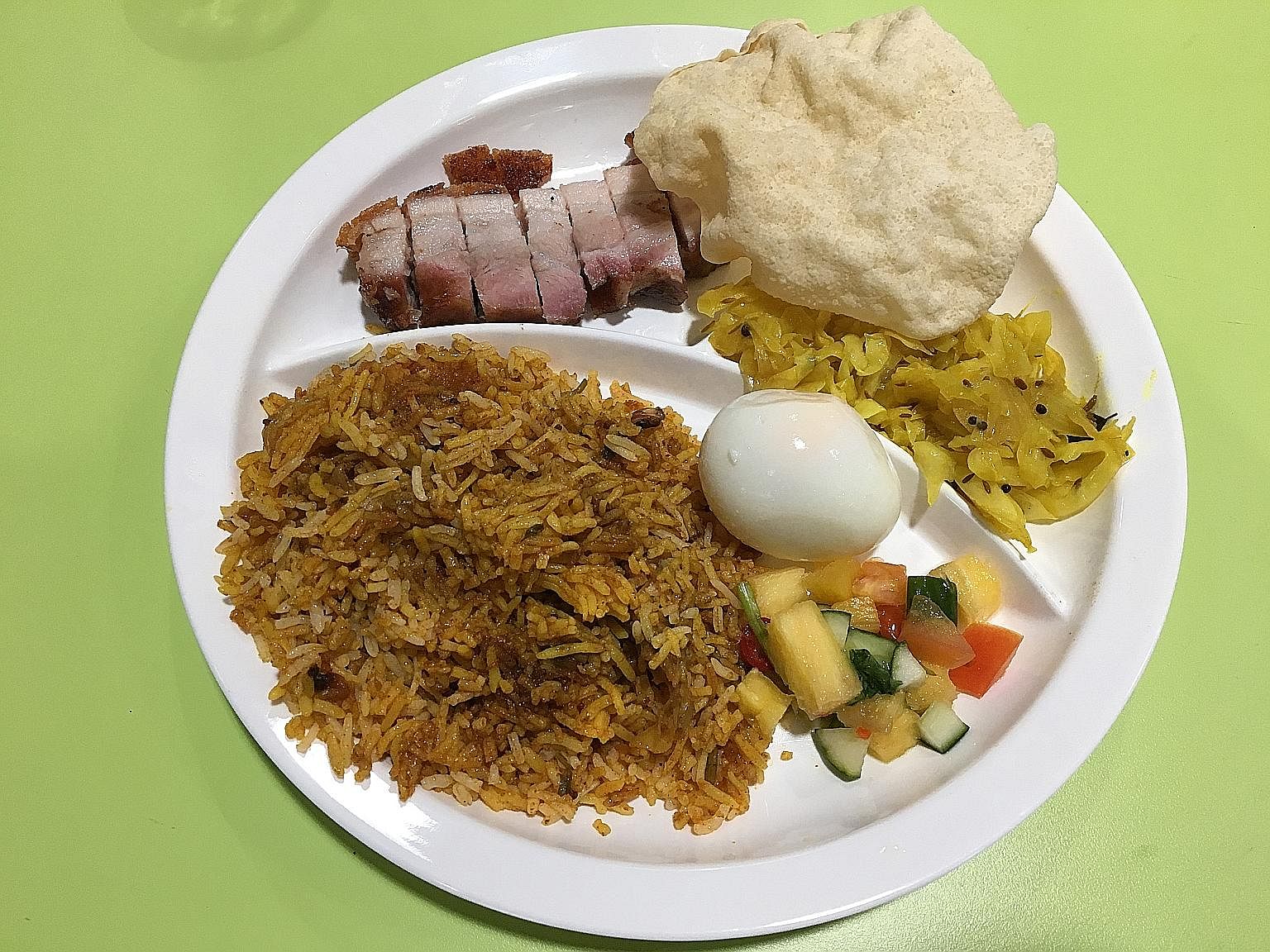
This review was first published on Aug 20, 2017.
This might sound odd, but I think a bowl of mee rebus should be served with bread to mop up the thick, piquant gravy; and slices of char siew, together with lettuce and mayonnaise, make a very fine burger.
I love experimenting with quirky mishmashes of hawker food.
So when I spotted "siew yoke biryani" sold at Chop Chop Biryani & Meats in Amoy Street Food Centre, I knew it was something right up my alley.
At the month-old stall, nasi biryani is served "Chinese-Indian style", according to owner Gino Goh, 33.
Diners have a choice of pork masala, sambal sotong, braised char siew and salted egg yolk popcorn chicken ($5 to $6) to go with the saffron-hued basmati rice.
Each plate is filled with rice, cabbage thoran, pineapple and cucumber salsa, a runny soft-boiled egg and a papadum.
Naturally, I went for the most eclectic combination of the lot - siew yoke biryani ($5), a cross-cultural marriage of the Persian- Indian rice dish with Cantonese-style roast pork belly.
The meat, which is chopped upon order from a huge slab, is on the firm side and could be juicier. It comes from Mr Goh's friend, who runs a catering business.
Despite being well-studded with cloves, star anise and cardamom, the spiciness of the rice barely packs a punch compared with versions from Indian-Muslim food stalls.
However, the mellow spiciness of the rice allows the saltiness of the roast pork belly to stand out.
The best part of eating the dish is biting into the squares of pork crackling in between spoonfuls of rice.
Mr Goh says the idea of pairing siew yoke with nasi biryani came during a potluck party, where he saw both dishes on the same table.
After three months of experimenting, Mr Goh, who was the head chef at the now-defunct Cafe Nido in Tyrwhitt Road, nailed his recipe for nasi biryani and came up with other creative meat pairings along the way.
Another popular dish is the char siew biryani ($5.50), introduced three weeks ago. It features a dark red, fork-tender slab of pork soft bone that has been braised for four hours in a sweet kicap manis sauce.
There may be no charred edges, but the trade-off is mixing the lean portions of the pork with the melt-in-the-mouth collagen bits.
Don't miss the pork masala biryani ($5). The morsels of meat are tender from being slow-cooked for 12 hours in tomatoes and spices. This results in thick and velvety pork that is more sweet than spicy, and it is a delight.
Mr Goh says he will continue to stretch the boundaries of nasi biryani by introducing other options, such as grilled sambal stingray and fried pork knuckle soon. I cannot wait.
WHERE: 02-101 Amoy Street Food Centre, 7 Maxwell Street
OPEN: 11am to 3pm (weekdays), closed on weekends
INFO: Call 8118-0657 or go to www.facebook.com/pg/chopchopamoystreefc
3. ANJALI RAGURAMAN RECOMMENDS
99BISTRO
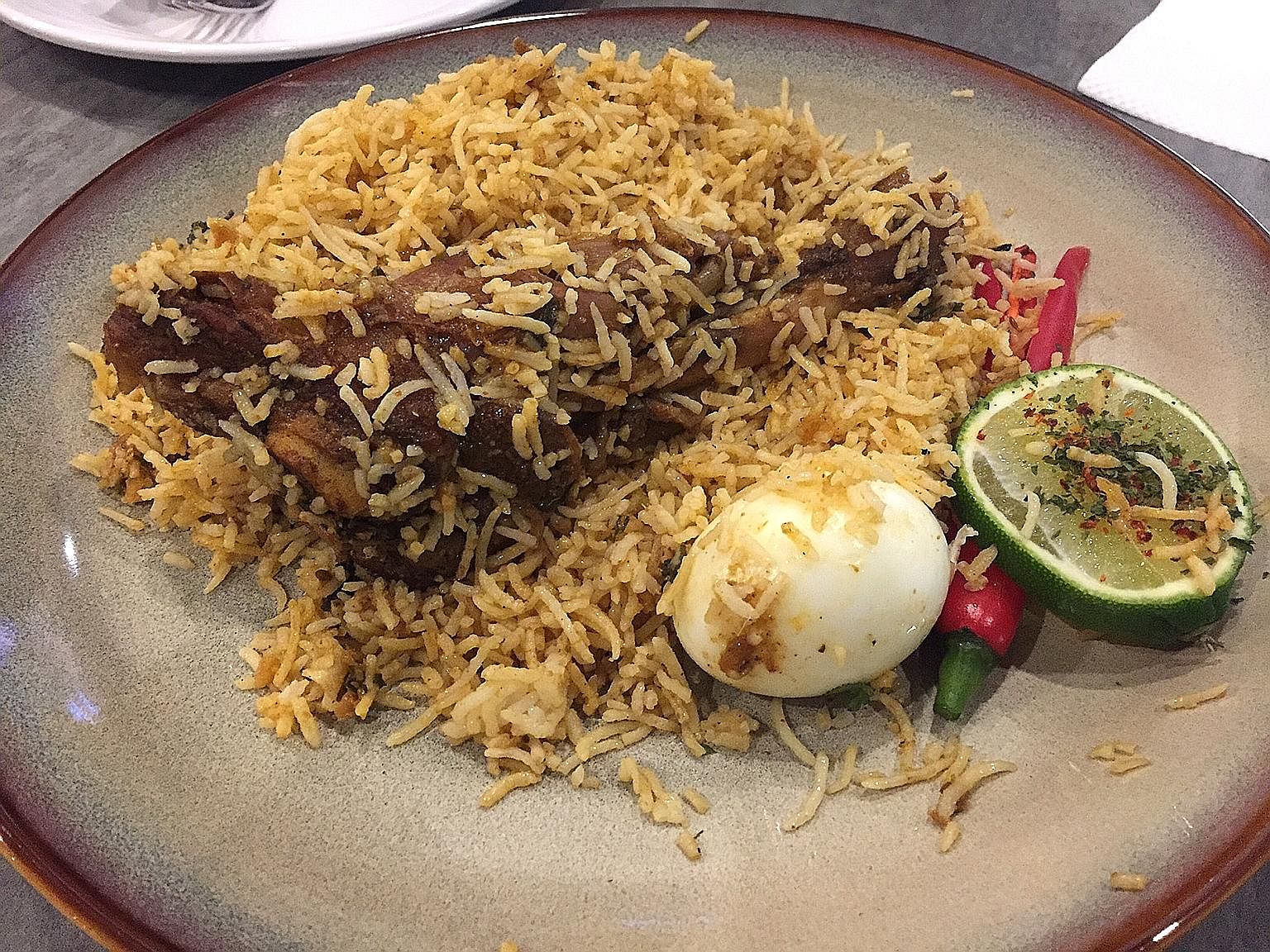
This review was first published on Apr 30, 2017.
Biryani rice comes in many forms, whether slow cooked in broth over the stove or via the "dum" method where it is sealed in a pot and cooked over coals.
But the version at multi-cuisine halal restaurant 99Bistro, a five-minute walk from Paya Lebar MRT station, is a more novel bamboo biryani.
Lamb shank from Australia, spices from Karachi in Pakistan and basmati rice from India are cooked in a bamboo stem from India. The dish is a fusion of a Middle Eastern- style biryani and a tribal Indian cooking method.
The dish was introduced only last week and is made to order, with the partially cooked rice stuffed into a metre-long bamboo stem, along with lamb shank that has been braised for two hours. There is about a 20-minute waiting time for the dish.
The bamboo adds little flavour to the dish, serving instead as a cooking vessel similar to puttu, a breakfast dish from the Indian subcontinent made with ground rice and coconut.
But part of the draw of the dish is the drama of its presentation. At the table, the chef explains how the dish is cooked before removing the banana leaf covering the opening of the bamboo. He then uses a thin bamboo stick to scrape out the briyani.
First, a hardboiled egg tumbles out, followed by the fragrant rice and a generous 250g piece of lamb shank.
The lamb is basted in its own juices while it is being braised. Hence the meat is mildly flavoured and not very spicy, unlike in a typical Indian or Pakistani-style lamb biryani. If you are looking for something spicier, this dish might not work for you.
The lamb is passably tender but the highlight of the dish is the aromatic, cardamom-studded rice which is infused with the flavours of the meat.
The light and fluffy rice goes wonderfully with the side dishes of a raita (yogurt sauce) and "salata hara", a version of Arabic salsa.
Made with chillis, tomatoes, mint and coriander, it is typically served with Arabic rice dishes containing chicken or lamb to add the spice kick missing from the meat.
At $24, the dish is slightly pricey, but it comes with two drinks, including a honey lemon digestive drink, as well as a rice kheer (Indian rice pudding) dessert.
The portion is generous enough for two people.
But if you still have extra rice left over, you may like to order a side dish of curry.
WHERE: 01-02 Lifelong Learning Institute, 11 Eunos Road 8
OPEN: noon to 3.30pm (Mondays to Saturdays), 5 to 8pm (Mondays to Thursdays), 5 to 10pm (Fridays and Saturdays), noon to 3.30pm (Sundays).
INFO: For reservations, call 6745-9958 or go to www.99bistro.com/ www.facebook.com/99bistro
4. ANJALI RAGURAMAN RECOMMENDS
AL AZHAR ITALIAN & MEDITERRANEAN RESTAURANT
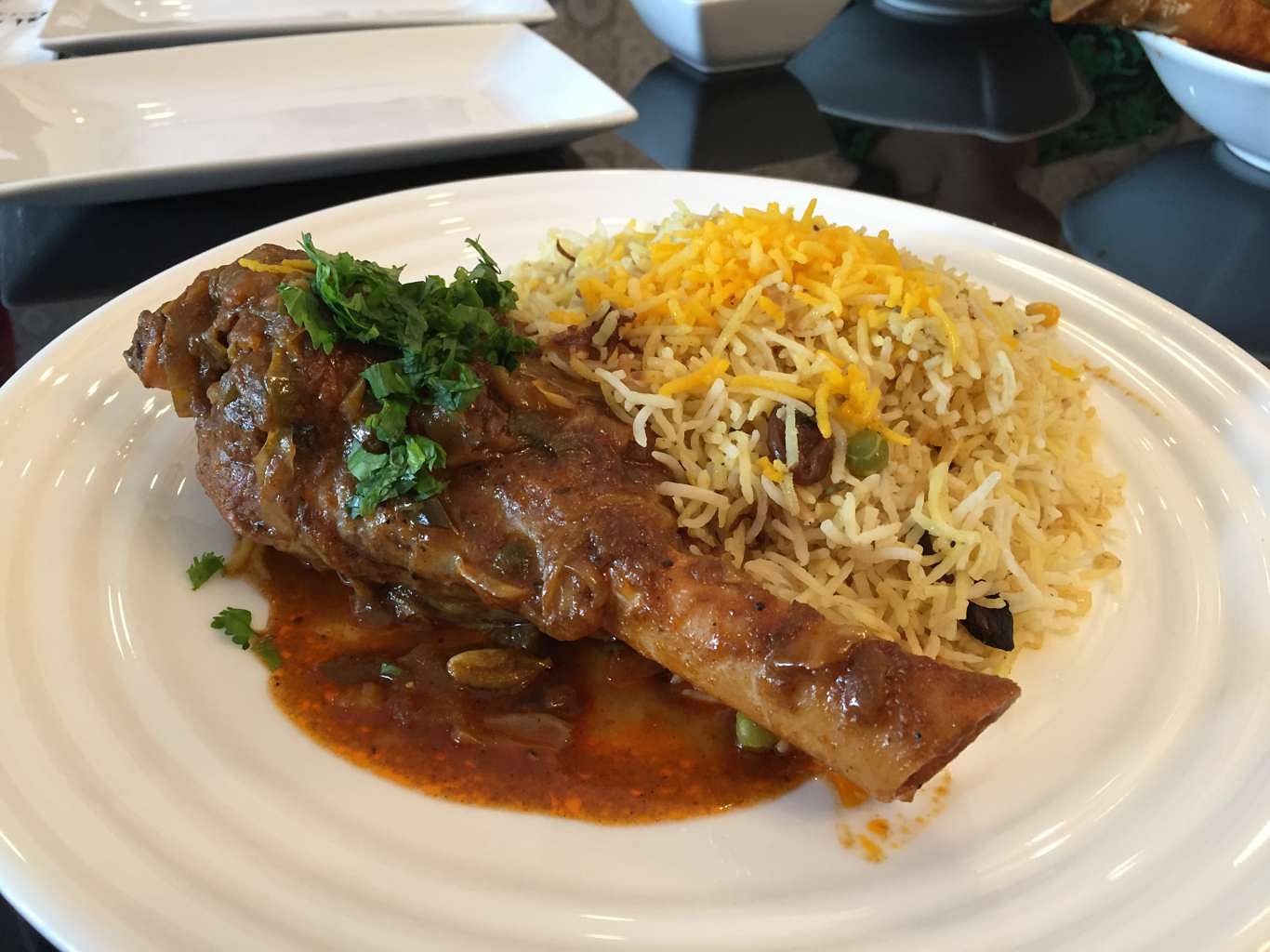
This review was first published on Dec 4, 2016.
Located 100m down the street from the west-side late-night supper institution that is Al Azhar is its fancier cousin - a restaurant with the same name, but serving Mediterranean and Italian food.
Instead of the fluorescent lights and plastic chairs of the 24-hour joint, there are upscale touches in the restaurant, which opened two months ago. These include wallpaper, hanging light fixtures and proper furniture and cutlery. Correspondingly, the food is more upscale, as are the prices.
Those wanting Italian fare can tuck into pizzas ranging in price from $11.90 to $19.90, and pasta dishes costing $7.90 to $14.90. The most expensive item on the menu is from the Mediterranean menu - a sharing platter with five different varieties of kebab, roasted vegetables, rice and stew.
But they are all sideshows to the real star of the restaurant - the lamb shank biryani ($15.90).
A sizable lamb shank, glistening with gravy, arrives atop a fragrant plate of basmati rice studded with cashews, raisins and mixed vegetables.
The meat is so meltingly tender that it falls right off the bone with a mere prod of the fork, and the bone is completely clean of meat by the time my dining companions and I are done with the dish. Additionally, the spices mask any gamey flavour from the lamb.
The gravy from the lamb seeps into the rice, so there is no need for extra gravy or raita on the side to moisten it.
Although the price seems high, the portion is big enough for two.
When I visited on a quiet weekday afternoon, only a few tables at the almost 60-seat restaurant were filled. But it is worth noting that on every table in the restaurant was the biryani, touted as an "Al Azhar signature dish".
There is also the option of the Mahiche (also $15.90), a Persian variation, which is the same lamb shank served with plain basmati rice and a forgettable "shirazi salad" made of peppers and cucumbers.
The flavourful biryani is a far better option.
After that, skip the overly sweet and adventurous drink options (such as the "mojo" or "mamarita", virgin versions of mojitos and margaritas) and head down to the original Al Azhar for a teh tarik or Milo Dinosaur.
WHERE: 22 Cheong Chin Nam Road, tel: 6463-2981
OPEN: 11.30am to midnight (Sundays to Thursdays), 11.30 to 1am (Fridays and Saturdays)
5. KENNETH GOH RECOMMENDS
PESHAWAR BRIYANI HOUSE
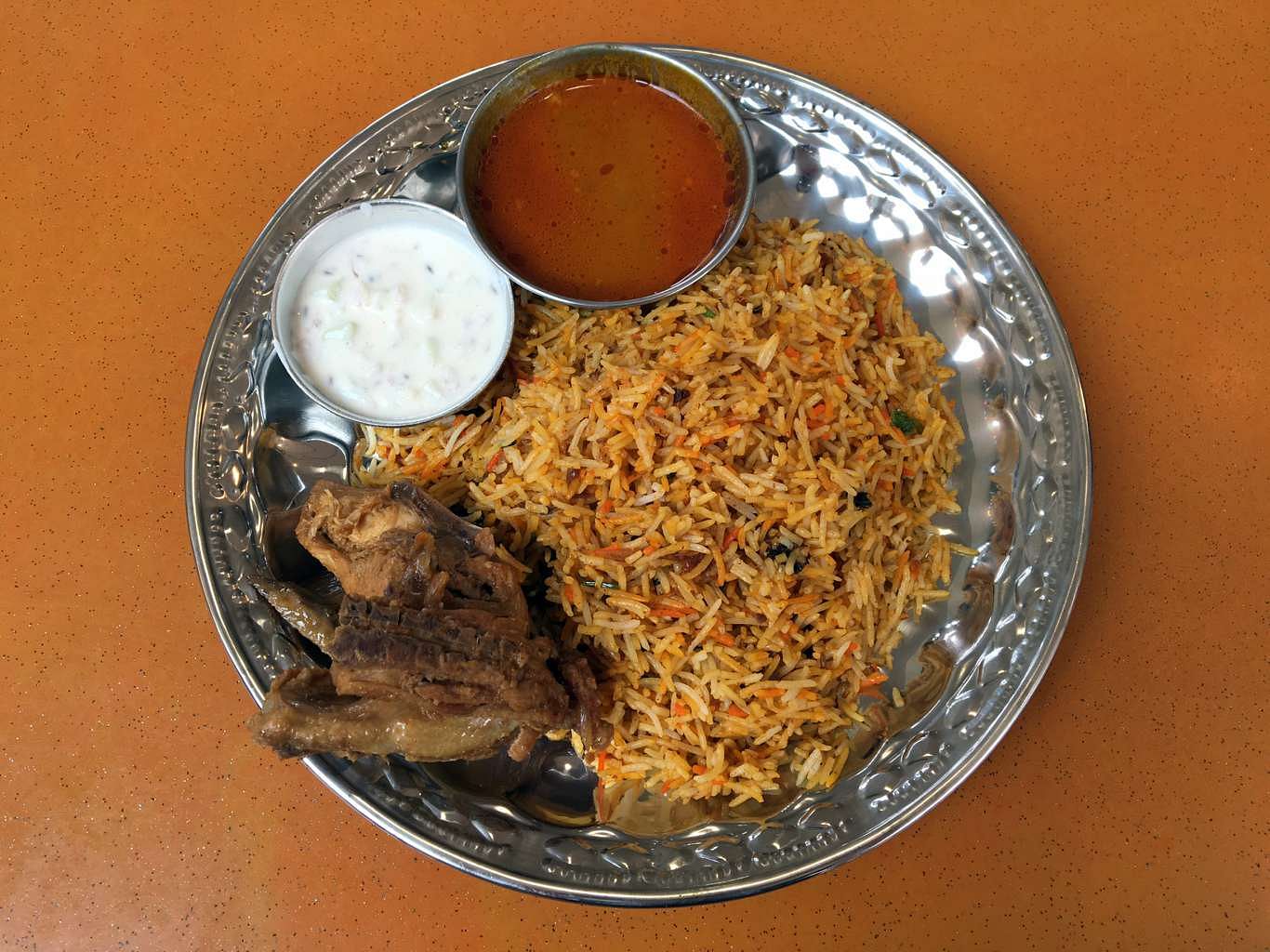
This review was first published on Aug 14, 2016.
I have been craving briyani the past month - partly because the well-loved Bismillah Biryani shop in Dunlop Street and one-north was recognised with the Bib Gourmand award in the Michelin Singapore Guide.
The craving increased after I read a recent article by the BBC on the evolution of briyani, from its likely origins in Persia (modern-day Iran) to the different varieties in countries such as India and Bangladesh.
Then I stumble on Peshawar Briyani House, a week-old stall in Taman Jurong Food Centre, which serves a Pakistani variant of the moreish rice dish.
The stall is co-owned by Mr Ahmed Khan, 36, who is taking his Pakistan-born wife's briyani out of their home kitchen. Her family comes from Peshawar, a city in northern Pakistan that the stall is named after.
There are at least three other stalls in the hawker centre that serve briyani, but the Pakistani version stands out because the basmati rice has a spicier kick and comes with raita (yogurt sauce) instead of achar.
Choose from two types of briyani on the menu - chicken ($5) or mutton ($6). The chicken briyani has a heap of saffron-hued rice that is perfumed by seven spices including cloves, garam masala and chilli powder, and flecked with coriander, tomato skin and onions.
The main difference lies in the chicken.
Instead of being clogged with curry, it is infused with briyani spices from being cooked in the rice and served separately from the curry.
Though not too juicy, the tender meat is a foil for the aromatic rice to shine through.
To douse the heat, I gingerly alternate each spoonful of rice with raita, which has diced onions, cucumber and cumin. The sour tanginess of the yogurt sauce is a good palate cleanser.
The rice is also cooked with meltingly soft mutton, like in a dum briyani. Each spoonful is a robust eruption of spices.
A hidden gem is the prawn briyani ($7), which is seldom served in hawker stalls. It is available on Fridays and public holidays and is not on the menu.
The spice level of the rice is toned down to highlight the sweetness of the three succulent sea prawns.
I usually zero in on the addictive papadum crackers first on my plate of briyani, but with such beautifully cooked rice and meat, I almost forget to pop them into my mouth.
WHERE: 3 Yung Sheng Road, Taman Jurong Food Centre, 02-114
OPEN: 10am to 2pm (Tuesday to Thursday), 10am to 4pm (Friday), 10am to 2pm (weekend), closed on Monday
